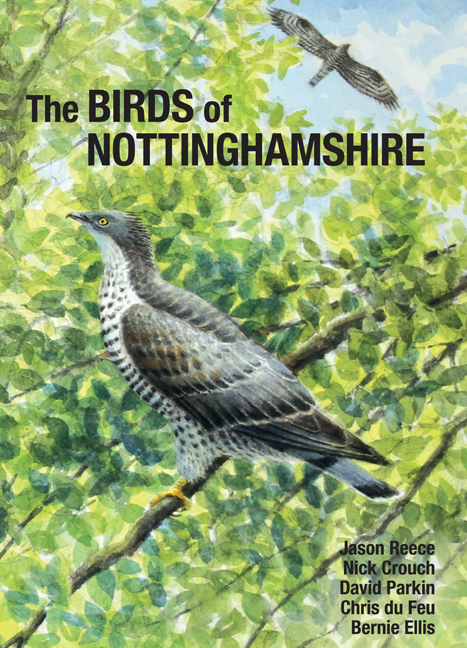Book contents
- Frontmatter
- Contents
- Foreword
- Acknowledgements
- Species sponsorship
- Introduction
- A history of bird recording in Nottinghamshire
- A description of Nottinghamshire and its bird habitats
- Methods
- Species accounts
- Additional Records 2014–2018
- Appendix: Additional and contentious species
- References
- Index
- Miscellaneous Endmatter
A history of bird recording in Nottinghamshire
- Frontmatter
- Contents
- Foreword
- Acknowledgements
- Species sponsorship
- Introduction
- A history of bird recording in Nottinghamshire
- A description of Nottinghamshire and its bird habitats
- Methods
- Species accounts
- Additional Records 2014–2018
- Appendix: Additional and contentious species
- References
- Index
- Miscellaneous Endmatter
Summary
Introduction
The history of birdwatching and recording in Nottinghamshire stretches back to the middle years of the reign of Queen Victoria, and there have been enormous changes in the way that the birdlife of the county has been documented since that time. These changes are linked to a wider shift in the nature of field ornithology at a national level over that period. Through the last 150 years, there has been a dramatic transition in the recording of Britain's birdlife, from what Peter Bircham has described as ‘a haphazard and largely ad hoc culture of recording Britain's birds’ to ‘a sense of order not just to recording birds but also, more importantly, to monitoring their status’ (Bircham 2007). This national transition can be demonstrated, at a county level, through a series of key stages.
Early naturalists
The early history of ornithology and bird recording in Nottinghamshire is fragmentary and there is little published evidence about the birdlife of the county before 1860.
Several leading naturalists were associated with the county prior to the middle years of the nineteenth century, but they found their fame beyond its boundaries. Two figures are particularly noteworthy. The seventeenth-century naturalist Francis Willughby (1635–1672), although born in Warwickshire, came from a distinguished south Nottinghamshire family, with its family seat at Wollaton Hall. He was a graduate of Cambridge University and an associate of the renowned botanist John Ray. It was Ray who oversaw the publication of Willughby's Ornithologiae libri tres after the latter's early death. This work is widely regarded as a key early text in the development of a proper understanding of ornithological taxonomy (Bircham 2007). Willughby is commemorated by a memorial in Southwell Minster. Almost 200 years later, John Wolley (1824–1859) achieved prominence as a notable naturalist and oologist. He spent his early years in Beeston and was educated at Mr Fletcher's Preparatory School in Southwell before progressing to Eton College and Trinity College, Cambridge. A man of independent means, he was a widely travelled naturalist, visiting Lapland, Norway and Finland between 1853 and 1857 in search of the eggs of rare breeding birds.
- Type
- Chapter
- Information
- The Birds of Nottinghamshire , pp. 2 - 20Publisher: Liverpool University PressPrint publication year: 2019



